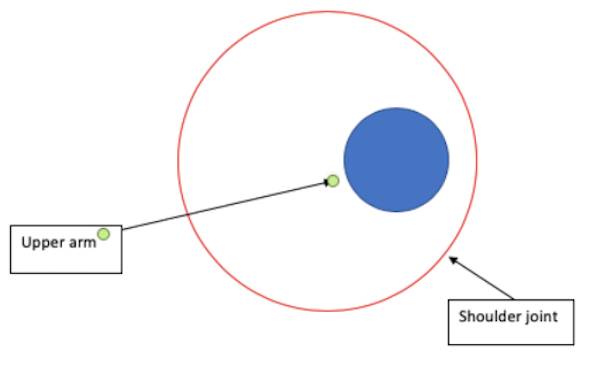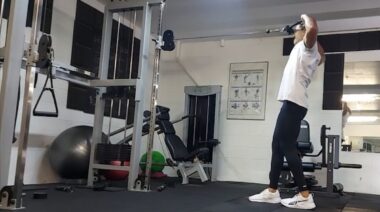The shoulder is the most mobile joint in the body, so it’s not surprising that it’s one of the most commonly jacked-up joints as well. Nearly everyone I have worked with has messed up their shoulder at one time or another (including me). It’s easy to do once you know how, thankfully, it’s also relatively easy to fix.
The shoulder is the most mobile joint in the body, so it’s not surprising that it’s one of the most commonly jacked-up joints as well. Nearly everyone I have worked with has messed up their shoulder at one time or another (including me). It’s easy to do once you know how, thankfully, it’s also relatively easy to fix.
To know what exactly we have to do, we have to understand how the shoulder works. The humerus bone (upper arm) is the ball of the ball-and-socket joint, and it sits in the glenoid cavity of the scapula, which, you’ve guessed, is the socket—a shallow socket at that.
Happy Shoulders
So this is a happy shoulder joint below.
- If your shoulder is truly happy, it should be sitting in the middle of the socket with all the tendons and muscles acting on it equally to keep it balanced, strong, and mobile.
- If you do too much of specific movements, it can cause an imbalance and pull the shoulder too far out of its happy place in the center of the joint.
- If all you do is bench, bench, bench, your shoulder is probably sitting somewhere around here.

Now you might not mind those rounded pulled forward shoulders, but I’ll tell you what you will mind.
The boo-boo you get once you try to do anything at all differently. What I’m trying to say is, if you have muscle weakness or tightness, it will affect how your shoulder operates.
Yadda, yadda, yadda.
Do you see where I’m going? What you need to do to fix all of your shoulder problems is to treat your shoulder joint like a joint. That’s it.
That means training it in all directions and ranges of motion under control.
And, I know it’s easy to say, but it doesn’t have to be that difficult to do either.
If I had to pick three things for you to add to your workouts to give you happy, healthy shoulders that can do anything you want them to, it would be these:
1. Shoulder Controlled Articular Rotations, (CARS)
No, not Brum, Brum cars. CARS is a fancy name but simple to do and a basic concept. It means just moving your shoulder through its full range of motion with control and intention.
Try this one below, and it should highlight any range restrictions you might have. This is the shoulder CAR from the Mobility Reset Program.
2. Cuban Rotations
These are just great. Cuban rotations strengthen all four rotator cuffs, and rotator cuffs are one of the main culprits in a shoulder injury. There isn’t enough time for all the good things I have to say about this exercise.
3. Work Your Extension
Most folks have terrible shoulder extension. Shoulder extension is a seriously undertrained range that your shoulder should have.
This quick video will show you how to build strength in that long-forgotten range.
Look, everyone wants to do the fun stuff. I get it. But you need to pay attention to the pitfalls of ignoring how your body is supposed to move because it will bite you in the ass, and you won’t be doing any fun stuff when you’re injured.
Keep an eye on your body because spending a bit of time keeping everything ticking over nicely will end up with you having more time doing what you love.
If you’re interested in moving pain-free, check out my Reset Series. It’s an easy to follow, and especially right now, at-home course to help you move better and pain-free.






